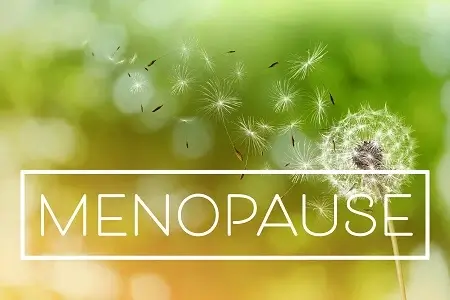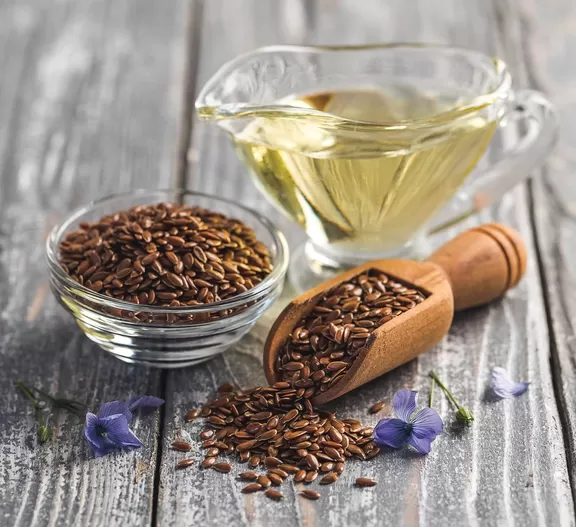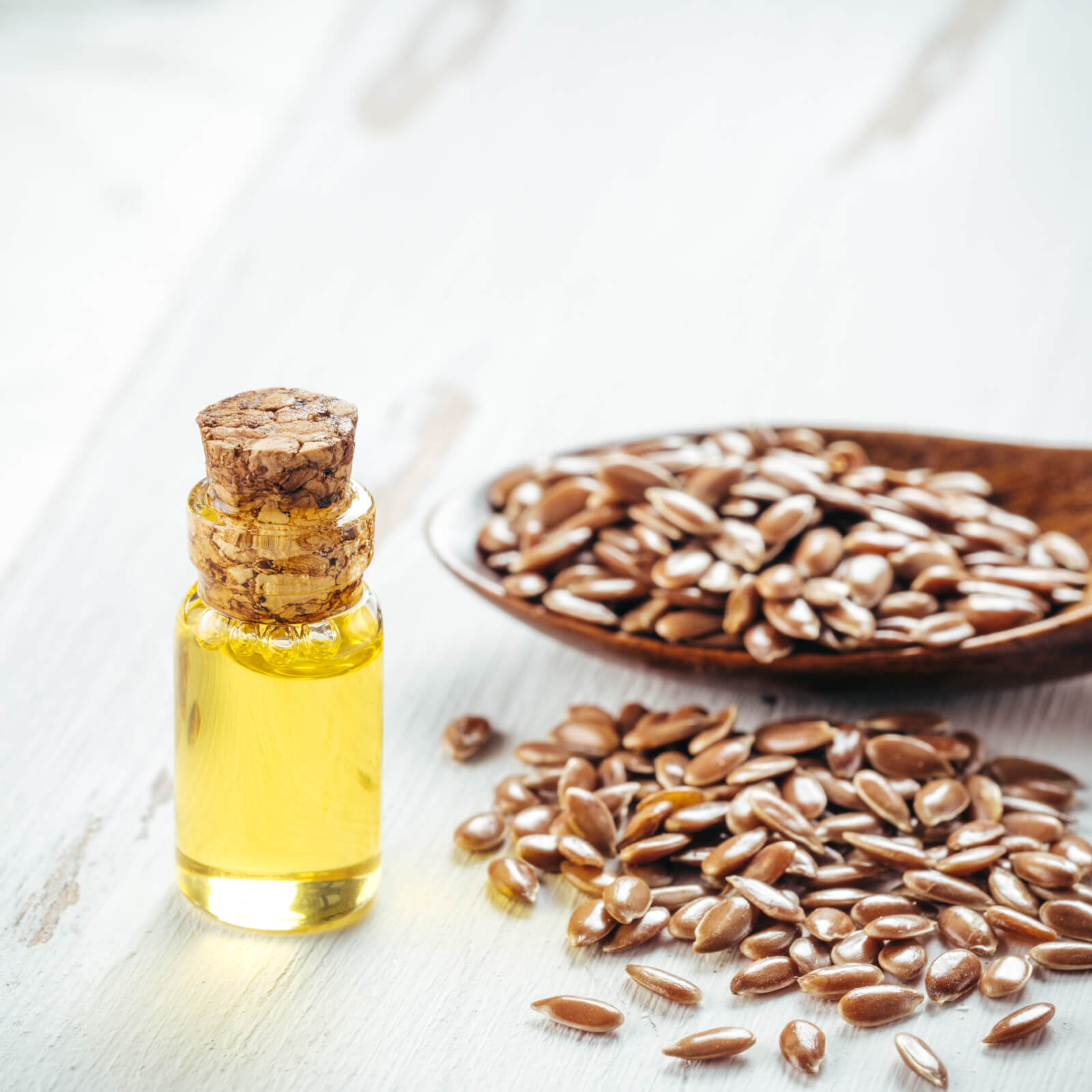
Will flaxseed (Linum usitatissimum) help in any way with menopausal symptoms? Generally, it appears that flaxseed may provide some benefit, but evidence is conflicting. Concerning a big menopause symptom, hot flashes, studies indicate that flaxseed does not help with hot flashes. I will discuss this and the research behind it more later on.
Concerning endogenous hormones, i.e., hormones that the body creates itself, flaxseed does not increase these either, instead it may reduce them.
But it may be due to the phytoestrogens (plant estrogens) in flaxseed that increase 2-hydroxyestrone, which is sometimes referred to as the "good estrogen." Again, if you want to further delve into this topic, I will go into detail shortly.
But, despite the lack of ability so far mentioned, flaxseed does seem to have some real benefits to menopausal women. Possibly one of the most interesting is a potential to help reduce cancer risk.
Another thing flaxseed may help with is bone strength. One thing many menopausal women know is that this change in the body can lead to bone weakness. A 2009 study in Menopause(source 14) found when flaxseed was combined with low-dose estrogen therapy it helped improve bone strength in rats.
A third reason to opt for flaxseed is it can help with menopausal women’s heart health. A 2013 book, Nutrition and Diet in Menopause,(source 15) stated that flaxseed appears to be a good choice for a heart healthy diet in postmenopausal women.
Lastly, it could help with menopausal women’s intestinal health. A 2022 study in the International Journal of Food Sciences and Nutrition(source 17) found that flaxseed could reduce intestinal permeability and bacterial toxin levels in the blood.
Plus, there are probably a wide assortment of health bonuses from getting flaxseed into your diet. Flaxseed has alpha-linolenic acid (ALA) in it and there are many benefits you get from ALA; e.g., heart health and cancer prevention.
So in general, flaxseed might not be the most ideal supplement for menopausal women, certainly not a panacea, but it might help some and it is very good for you!
Naturally Defeat Menopause Symptoms
If you’ve tried everything, and seen the same old menopause advice; Ms. Julissa Clay, a university medical researcher, invested over 850 hours developing her own natural solution to menopausal symptoms. It works for about 95% of the women who try it.
Find out the unique way Ms. Clay freed herself from these symptoms; backed by a 60 day, 100% money back guarantee.

The Best Way to Consume Flaxseed
As you may know, there are three primary forms in which you can consume flaxseed: whole, ground, and flaxseed oil. But is there a best form of these three to consume? A 2023 study in Healthcare(source 11) discussed this exact topic.
Flaxseed oil contains close to 53% alpha-linolenic acid (ALA); which puts it as the richest source of ALA from plants. Flaxseed oil also contains about 19% oleic acid.
ALA is a beneficial compound due to its antiproliferative (tending to suppress the growth of cells) and anti-inflammatory properties; which grant this compound an anticarcinogenic effect. As a result, ALA can prevent the development of cancerous tumors and their metastases.
In addition to anti-cancer ability ALA has a positive effect on lipids in the blood. Studies have shown that ALA can reduce the total cholesterol of blood plasma, VLDL, and LDL cholesterol.
But although flaxseed oil is rich in ALA it is also the most vulnerable to oxidation. If left at room temperature, flaxseed oil will oxidize within one week, making it unusable for consumption. If refrigerated in an opaque glass container, it can be safely stored for up to 6 months.
One way to prevent oxidation of this oil is by adding it to baked foods.
This particular paper recommends going with ground flaxseed due to the oil’s propensity to go bad. Ground flaxseed has a similar amount of ALA in it. Yet, try to use the ground flaxseed shortly after it is ground.
Concerning the whole flaxseed, it will give you the lowest amount of ALA in these three types due to the hard seed coat.
End Menopausal Weight Gain
Deborah Murtagh is an international weight loss coach, avid writer and researcher, and founder of several best-selling weight loss programs with thousands of clients in over 48 countries.
Learn Deborah’s ideal plan for losing weight during menopause from a woman who struggled her entire life with weight gain.
Ms. Murtagh’s program comes with a 60 day, 100% money back guarantee.

Does Flaxseed Reduce Hot Flashes?

Why not use both herbs at the same time?
In short, it appears that flaxseed does not reduce hot flashes during menopause. The research to support this statement is explained next.
A 2012 study in Menopause(source 1) investigated how supplementing the diet with flaxseed would help with hot flashes. 178 women started the study and about half were given flaxseed and the other half a placebo. The women took the assigned treatment for 6 weeks.
The flaxseed was provided as a bar that had 7.5 g of flaxseed (providing 410 mg of lignans). The women who got the placebo were given a matching bar that did not have flaxseed. Participants were instructed to eat one bar each day.
Oddly enough, the average percentage of hot flash frequency declined for both the flaxseed and placebo groups by about the same degree by the 7th week. Both groups had an average percent decrease in hot flash frequency of about 29%. Average hot flash scores dropped by 4.9 points in the flaxseed group and 3.5 points in the placebo group.
A 2006 study in Menopause(source 2) also looked at how flaxseed and soy would influence hot flashes in women 1 to 8 years after menopause. The study was a double-blind, randomized, controlled, intention-to-treat trial. The study included 87 women who completed the trial.
Women were divided into three groups and given muffins containing either ground flaxseed (25 g of flaxseed, 50 mg of lignans), soy flour (42 mg of isoflavones), or wheat flour (serving as the controls). Women were given the muffins for 16 weeks and ate one each day.
The study, unfortunately, found that the flaxseed and soy muffins did not decrease hot flash frequency at any point during menopausal transition. The study also suggested that flaxseed and soy do not affect the severity of hot flashes either.
A 2016 review study in the Avicenna Journal of Phytomedicine(source 3) looked at studies looking at how flaxseed would impact various aspects of menopause, one being hot flashes. In total, 9 studies that were randomized controlled trials were included in this review.
This review found that flaxseed did not show any statistically significant positive effect on hot flash frequency and intensity.
Dr. John Herzog (MD)
Dr. John Herzog, a "survival surgeon" from Maine explains what home remedies work best in a crisis situation.
This may be important in the event you require first-aid or are in an emergency situation without easy access to a hospital. Dr. John Herzog has assembled a large collection of home remedies for such scenarios.

Does Flaxseed Increase Estrogen Levels?
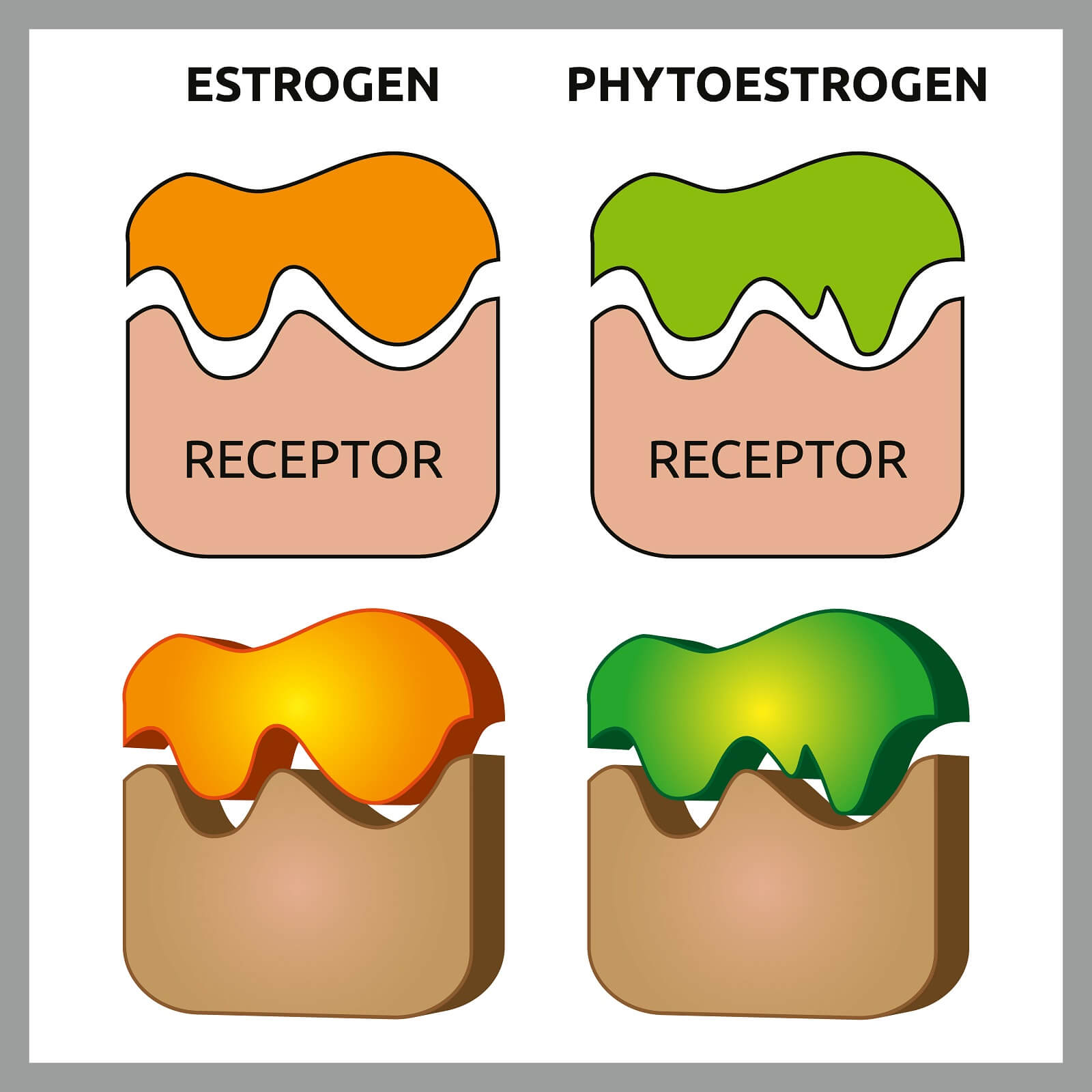
A 1999 study in Nutrition and Cancer(source 4) looked at how flaxseed consumption would influence estrogen levels. In short, the study shows that it is reasonable to assume flaxseed does increase the amount of estrogen in postmenopausal women.
The study states that flaxseed is the richest known source of plant lignans. Lignans are polyphenols found in plants that have a chemical structure similar to steroids and are defined as phytoestrogens (plant estrogens). Some of the effects of flaxseed may be due to interaction with a person’s own hormone production and metabolism.
This study involved 28 postmenopausal women and were studied for three 7 week periods in which the participants added ground flaxseed (0, 5, or 10 g per day) to their diets.
The study found that consuming the ground flaxseed increased total urinary 2-Hydroxyestrone excretion and the 2-hydroxyestrone to 16 alpha hydroxyestrone ratio in a linear, dose-dependent way while not increasing 16 alpha hydroxyestrone excretion. 2-hydroxyestrone, and 16 alpha hydroxyestrone are different types of estrogen produced from the body metabolizing estrogen.
Just to put it simply, if the ratio is a fraction 1 / 10 = 0.1; then, the ratio is small. As the first number gets bigger, say 100, then 100 / 10 = 10, then the ratio is 10 and much bigger; than say 0.1. Same for 2-hydroxyestrone to (divided by) 16 alpha hydroxyestrone. Thus the ratio got bigger because there was more 2-hydroxyestrone compared to 16 alpha hydroxyestrone.
2-hydroxyestrone is sometimes referred to as the "good estrogen." This is because it does not stimulate cell division which can damage the DNA and cause tumors. Additionally, 2-hydroxyestrone may have a blocking action that stops stronger estrogen products from dominating cells. As a result, 2-hydroxyestrone is suggested to have anti-cancer ability.(source 5)
The 1999 Nutrition and Cancer(source 4) study speculated as a result of their findings ground flaxseed may have a chemoprotective (helps protect against cancer) effect for postmenopausal women. And, the study does state it is reasonable to attribute the increase in estrogen to the flaxseed supplementation.
A 2001 study in Nutrition and Cancer(source 6) looked at how eating flaxseed would influence endogenous hormone (endogenous means originating from within the organism, and not from the outside, so these hormones are those the body creates) concentrations in postmenopausal women.
The study included 28 postmenopausal women aged 52 to 82 years, who ate their normal diets plus 0, 5, or 10 g of ground flaxseed. The study found that this led to a statistically significant reduction of 17 beta-estradiol by 3.26 pg/ml (12.06 pmol/L) and estrone sulfate by 0.09 ng/ml (0.42 nmol/L).
17 beta-estradiol is endogenous estradiol(source 7) and ovarian produced 17 beta-estradiol is the predominant form of estrogen in the blood in women.(source 8)
The 2001 study in Nutrition and Cancer(source 6) stated that:
In this group of postmenopausal women, consuming flaxseed in addition to their habitual diets influenced their endogenous hormone metabolism by decreasing serum [17 beta-estradiol] and estrone sulfate and increasing serum prolactin concentrations.
Nutrition and Cancer [39.1 (2001): 58-65]
So it would appear that flaxseed consumption reduces the amount of the primary form of estrogen, that the body makes itself (endogenous 17 beta-estradiol), that circulates in the blood.
Another study, published in 2008 in Nutrition and Cancer,(source 9) looked at how flaxseed would influence estrogens and androgens in postmenopausal women. The study was focused on blood hormones that may play a role in breast cancer.
48 postmenopausal women participated and ate 7.5 g/day of ground flaxseed to start for the first 6 weeks. Next, they ate 15 g/day for 6 more weeks.
The study found a reduction in estradiol, estrone, and testosterone during the 12 week period; yet, these reductions were not statistically significant. These changes tended to be more dramatic in obese women. The study states: Our results suggest that dietary flaxseed may modestly lower serum levels of sex steroid hormones, especially in overweight/obese women.
A 2003 study in the Journal of the American College of Nutrition(source 10) looked at how flaxseed would influence the blood hormone levels in premenopausal women. In short the study found that, although the amount of lignan excretion in urine increased with flaxseed intake, it did not alter the levels of blood hormones.
The study included 16 women who ate flaxseed; taking 10 g of the seeds each day for an 8 month period.
Thus, it appears it is safe to conclude that flaxseed probably won’t alter endogenous (made by the body itself) estrogen levels for women.
But, it is fair to say that the lignans in flaxseed may have a protective role against cancer, and may have benefits outside of modulating the levels of body-made estrogen and other hormones in the blood.
Claire Goodall’s Amazing Guide
Clair Goodall is a bee-obsessed, natural medicine convert from Minnesota (USA). And, she does keep bees!
Clair has created 350+ page book documenting how to replace the toxic products and medications in your home with healthier, all-natural alternatives.

Research on Flaxseed & Menopause
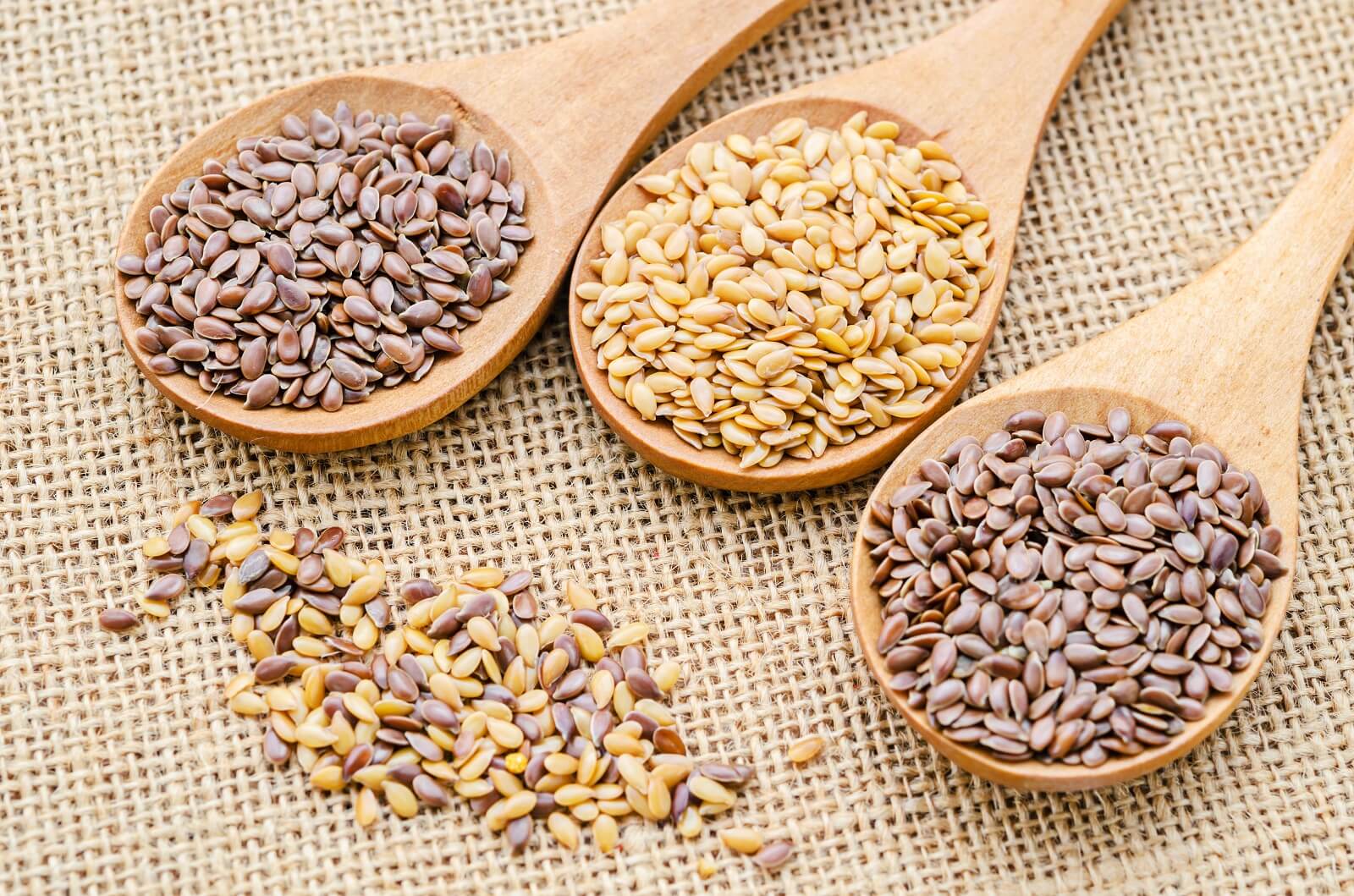
A 2015 study in Holistic Nursing Practice(source 12) looked at how flaxseed would impact menopausal women. The study was conducted with 140 women. The women who were given flaxseed in this study all took 5 g of these seeds daily.
The 140 women were divided into different groups. 70 women who were not taking hormone replacement therapy (HRT) were put into an experimental group. This experimental group received flaxseed, and half of these women received training and a booklet on how to cope with menopause.
35 women who were taking HRT were put into an experimental variable group and were not given flaxseed.
35 women who were not using HRT and not given flaxseed were put into a control group.
A menopause rating scale (MRS) was used to assess the severity of menopausal symptoms.
Concerning the 70 women not using HRT and taking flaxseed, 35 women receiving no training saw a drop in MRS scores of 8.7%. The 35 of them given training saw a drop in MRS scores of 9.8%.
The 35 women using HRT only saw a drop in MRS scores of 10%. 35 women not using HRT who did not receive flaxseed (control group) had an increase in MRS scores of 6.9%.
The reduction in MRS scores observed in the women were found to be statistically significant.
Thus this study suggests that flaxseed supplementation of 5 g per day can help about as much as HRT can. Which appears to be a very interesting finding.
Evidence Against Benefits
Evidence against these claims comes from a 2010 study in the The Journal of Nutrition.(source 13) The study included 38 women who had been postmenopausal for 1 to 10 years and consumed 25 g flaxseed (46 mg lignans) each day for 12 weeks.
The study found that flaxseed was no more effective than placebo in reducing hot flashes and menopausal symptoms.
Flaxseed Plus Hormone Therapy Helps Bones
A 2009 study in Menopause(source 14) looked at how flaxseed alone, flaxseed combined with low-dose estrogen therapy, would impact bone tissue in rats with their ovaries removed. Rats given a normal diet served as negative controls. Rats given a sham surgery (placebo surgery; a surgical intervention that doesn’t include the step that is therapeutically necessary), and still had their ovaries, served as positive controls.
The flaxseed diet given to the rats consisted of their normal diet but with 10% of it being flaxseed.
The study found that flaxseed alone had their lumbar vertebrae strength about the same as the negative controls. However the lumbar vertebrae strength of the rats given flaxseed plus low-dose estrogen therapy were about the same as positive controls.
The study’s abstract relates the concise results of this study:
Flaxseed + low-dose estrogen therapy resulted in the highest bone mineral density and peak load at the lumbar vertebrae, with no effect on bone mineral density or strength in the tibia and femur. Flaxseed and flaxseed + low-dose estrogen therapy resulted in significantly higher relative levels of α-linolenic acid and eicosapentaenoic acid and lower levels of linoleic acid, arachidonic acid, and n-6/n-3 ratio in the lumbar vertebrae and tibia compared with all other groups.
Menopause [16.3 (2009): 545-554]
Flaxseed is Good for Heart Health in Postmenopausal Women
The 2013 book Nutrition and Diet in Menopause(source 15) had an entire chapter discussing how flaxseed could impact the heart health of postmenopausal women. Overall, the book stated that flaxseed appears to be a good choice for a heart healthy diet in postmenopausal women.
The book states that, in general, animal and human research has shown that regular consumption of flaxseed in ovarian hormone deficiency might reduce cardiovascular disease risk factors. The predominantly observed positive effect of these seeds on postmenopausal women is the ability to improve the lipid profile.
Studies have shown, up to the date of this book’s writing, the isolated components of flaxseed have a modest effect in changing cardiovascular disease risk factors in postmenopausal women. And, postmenopausal women might be helped more by using whole flaxseed instead of just supplementing with an isolated compound (e.g., alpha linolenic acid, lignan, fiber) in these seeds.
A quotation from the book sums up the general thought conveyed: Taken together, the results of clinical studies demonstrate that flaxseed can be a part of a heart healthy diet of postmenopausal women.
Additionally, some other positive effects of flaxseed for these women are as follows:
- Blood pressure
- Blood glucose
- Antioxidant status
- Endothelial function (the endothelium is a single layer of cells that line the inner surface of the blood vessels and lymphatic system(source 16))
- Body weight
- Inflammatory markers
Flaxseed is Good for Intestinal Health of Perimenopausal Women
2022 study in the International Journal of Food Sciences and Nutrition(source 17) looked at how flaxseed would influence intestinal permeability, endotoxemia (endotoxins come from dead bacteria; these toxins then pass the gastro-intestinal barrier into the bloodstream), and lipid profile of perimenopausal (the period shortly before menopause), overweight women.
The study looked at two different types of flaxseed as well; brown flaxseed (BF) and golden flaxseed (GF). Thus, this research sheds some light onto the question of which flaxseed type is best.
The study involved 30 participants that were divided into three groups, one given BF, one given GF, and a control group. Those given flaxseed took 40 g for 12 weeks.
The study found that both flaxseed types reduced intestinal permeability in a statistically significant way. Bacterial toxin levels in the blood were reduced in both flaxseed groups. Additionally, the GF group saw reduced low-density lipoproteins (LDL).
The study made the following conclusion: Brown and golden flaxseed can be a promising alternative for the prevention of metabolic changes caused by menopausal transition, and for the improvement of the intestinal health.
Flaxseed Side Effects & Guidelines
Flaxseed is generally safe, but there are some side effects to be aware of. The mucilage in it might interfere with the absorption of medications. And, you may want to limit small children’s intake of it because it does result in a little cyanide being put into the body due to the presence of cyanogenic glycosides (these chemicals are found in other plants and are not that unusual).
Aside from the possibility of constipation if you do not drink enough water when you take it, it is probably unlikely that adults will have problems if they consume reasonable amounts.
But, Herbsey does have an entire article on the side effects of flaxseed, which goes into greater detail. If you’d like to learn more, and get a fuller understanding about this helpful food, you can check it out:
A Worry Free, Natural Solution for Menopausal Symptoms
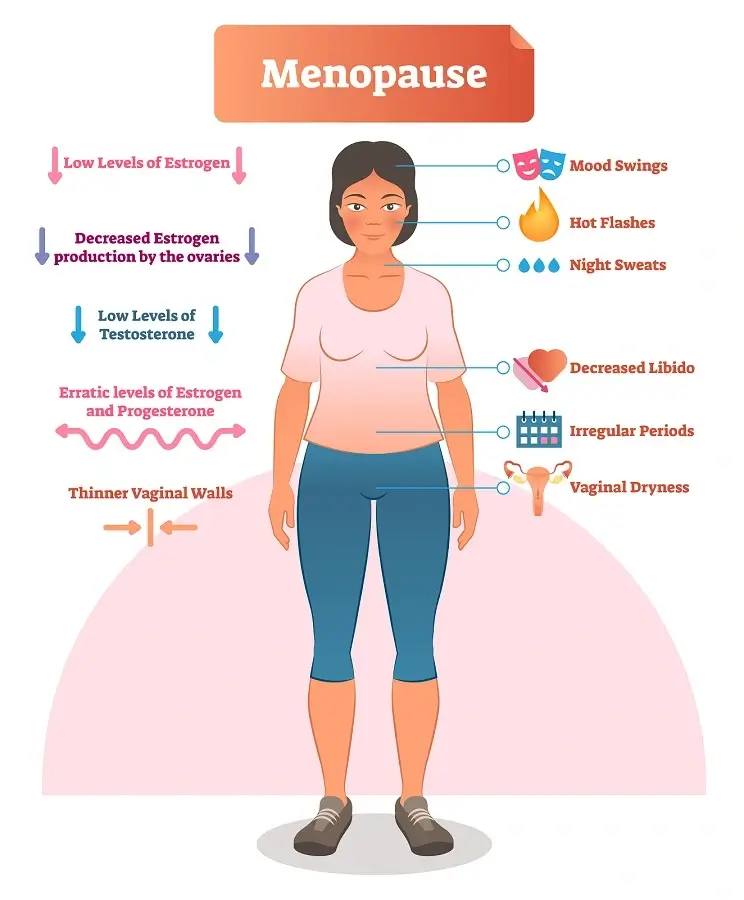
The daunting risks of hormone replacement therapy (HRT), are a reason many women seek out natural alternatives. Julissa Clay was a woman with the same mindset. Although she successfully navigated the symptom perils of perimenopause (the time frame your body starts transitioning into menopause), something unfortunate happened.
Due to problems with her uterus, she had to have it surgically removed. Thankfully, as Ms. Clay says about her surgery: "Luckily, everything went fine and I was lucky enough to walk out of the hospital with nothing but a few puncture wounds from a state-of-the-art surgery."
Yet, soon after entering into surgical menopause she found herself learning what her mother told her hot flashes first hand; plus, her desire for intimacy, ability to keep weight off, and energy reserves were significantly impaired.
She would soon find out these were not residual effects of surgery, this is what many women go through during this important time in their lives.
After trying a host of treatments and internet searches, not to mention eating more soy tofu than a Japanese vegetarian, she hadn’t found a workable solution.
But, Julissa had a secret weapon in her corner: She had spent 5 years as a medical student at a prominent university. So, she knew how to do her research.
Ms. Clay discovered that although you can’t cure menopause, it’s a natural process women go through, you can put a stop to the symptoms that get in the way of quality of life.
Also, Ms. Clay, after learning how to address the symptoms of menopause delved deeper into learning about natural medicine; the end result being so she could synthesize a natural treatment plan that would not keep her up at night worrying about unwanted side effects.
After over 850 hours of research, testing, and refining, Ms. Clay developed a fast and safe solution for menopause symptoms. After testing her program in controlled conditions, 95.4% of women saw it work. And, the 4.6% that it didn’t work for, they lost weight and had more energy as a result.
It may sound too good to be true, but treating menopause is a big business; and, there is little attention probably made to halting the influx of cash by 95.4%.
And, if you want to investigate Ms. Clay’s treatment plan, you can know it is backed by her U.S.A. based publisher’s 60 day, 100% money back guarantee.
If you’d like to learn more about Ms. Clay and her exceptional program, you can find out much more at Julissa Clay’s official program website.
About the Author
Geoff Kent is a natural medicine enthusiast who has been researching and writing about natural medicine since 2008. Geoff is primarily a web developer, but also researches and authors written and video content about natural health. Geoff has a bachelor’s degree in Management Information Systems from the University of Northern Iowa.
More on Geoff KentImportant Disclosures & Disclaimers
It is important to use the information you find on Herbsey.com in the right way. Also for legal reasons, these disclaimers and disclosures are necessary. For further information about each, feel free to click the link provided to the page on this website that provides more information.
Medical Disclaimer
The information on this website is not a prescription for anyone. This information is for informational or educational purposes only, and is not a substitute for professional medical advice or consultations with healthcare professionals.
Advertisement Disclosure
Some of the links provided on this article and website are affiliate links. If you purchase a product after clicking on these links, Herbsey.com will earn a commission. Herbsey.com promotes various products through advertisement and text links. For more information: Our Advertisements.


